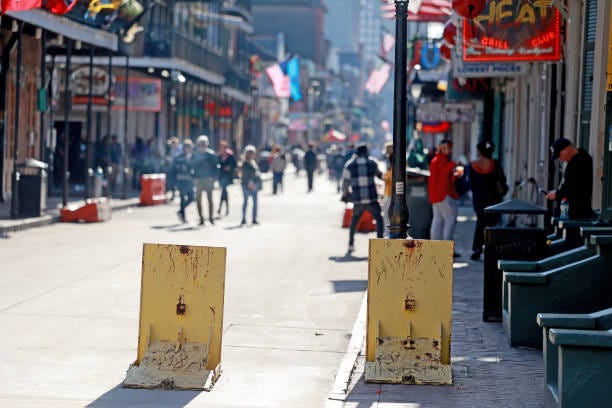
Yesterday was bitter.
I was, as I’m sure you were, full of sadness, anger, and confusion.
A terrorist entered our city with the intent to kill and he executed 15 innocent people, people who were out celebrating the new year, a night meant to symbolize hope and rebirth. Some of these victims were our friends, family, and loved ones.
Yesterday, we all woke up and had to sort out this unspeakable act of horror and mayhem.
Then, of course, came everything that follows such an event: the investigation, assessing the damage, a desperate search for motive and accomplices, numbering and naming the victims, and alerting their families.
A flurry of press conferences, a river of tears, a maze of caution tape, a New Year’s day spent scouring the French Quarter for makeshift bombs.
Yesterday will forever be remembered as one of the darkest days in this city's history.
Now the question lingers in everyone's mind: was it preventable?
Was there something we missed? Is there someone to blame? Will it happen again?
As deep as the pain runs, and as many times as this city has had to bear the weight of incalculable grief, the way I see it, this act of terror wasn’t about the city of New Orleans.
When you get down to it, terrors of this kind are borne of a radical mindset that seeks to undermine and destroy the freedoms we enjoy and defend in this country. But we can’t let it.
It’s important to keep things in context. What happened yesterday could’ve happened anywhere. But it happened here, in New Orleans, which means it’s the responsibility of the people of this city to represent ourselves in the way we always have—with resiliency and courage.
And as we march forward we can’t sacrifice the larger picture for minor details. We must stay focused on overarching goals, and that's hard to do in such a time of grievous uncertainty.
Yesterday, there were a lot of talking heads. Far too many, just go back and listen to the pressers. So much chatter and not enough sticking to the mission at hand.
And what is that mission? If you ask me, it's the minimization of risk, not the elimination of it. Because, sadly, eliminating all risk is just flatly impossible.
For example, there was a lot of defensiveness during the press conference about the bollards, as if they were the end-all-be-all solution.
Frankly, I don’t know if yesterday was the time or place to talk about bollards. But I do know what is appropriate to discuss at this time: the idea that when a city decides to deploy a specific security protocol—it must execute.
Obviously, Bourbon Street and the French Quarter have been identified as real estate deemed worthy of extra security measures. With that comes the responsibility to execute those measure to ensure the area remains as safe as possible.
But yesterday, we heard our city officials admit that the safety barricades that stand at the mouth of Bourbon Street were known to be malfunctioning. The barricades were there, they just failed to execute proper maintenence.
The bollards are only one meager example of something that should've been kept functioning for its own sake—not just because the Super Bowl is coming to town.
It’s called preventative maintenance. Our systems should always be operational until they aren’t. And when they aren’t, you fix them immediately to avoid downtime and minimize risk.
Again, it’s not just about bollards, it's about the execution of the security measures we deemed worthy to invest in to minimize risks. It’s these conversations that must take place as a result of what happened yesterday. And, yes, people must be held accountable.
But we must also remain realistic. Because, ultimately, we can’t bollard our way to a crime-free Bourbon Street. Terrorists look for opportunities where key targets like the French Quarter are stretched to the max. That’s how they inflict maximum damage and can catch law enforcement with its guard down, which is why it takes all three levels of law enforcement—federal, state, and local—to identify risk and identify bad actors early.
Again—it’s about minimization, not elimination. That's why making statements like “we’re going to make X, Y, or Z location completely safe” doesn't help.
Yesterday is over. But what happens now will echo into the future.
Now, it's up to us, the citizens and officials of this city, to ensure we take the steps necessary to reduce the likelihood of another horror unfolding when we least expect it.
There's no way to fully stop someone committed to an act of terror, and there will always be those hellbent on shaking our resolve. But I have no doubt this city will come out the other side even stronger and better equipped to defend the traditions and culture we hold so dear.
There are so many questions left to answer, and so many pieces of this tragic puzzle left to put into place.
But even now, the lights Bourbon Street have been switched back on. The Sugar Bowl is underway. There's foot traffic in downtown New Orleans. We’re making preparations for our the busy weeks to come.
Today is a new day, and it's our responsibility to preserve and work to protect this city, and to remain resilient in the name of those we lost yesterday.
